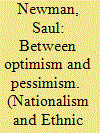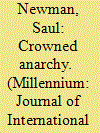| Srl | Item |
| 1 |
ID:
116229


|
|
|
|
|
| Publication |
2012.
|
| Summary/Abstract |
The Oslo Accords failed to end Israeli-Palestinian violence and led to a final settlement of the conflict. This article examines Israeli attitudes toward conflict resolution and argues that the peace process, despite its setbacks, has increased Israeli support for certain concessions. While support for the "Oslo Process" may have declined, Jewish Israeli acceptance of the creation of a Palestinian state has risen dramatically. Israelis remain committed to continuing the peace process, they just remain highly skeptical that the process will succeed. The article examines the sources of this skepticism. Both lack of trust in Arab aspirations and religiosity are the primary determinants of Israeli unwillingness to make concessions for peace. Trust is tied to present conditions rather than past conditions of conflict. Thus, if trust could be rebuilt, Israeli Jews would be considerably better poised to make political and territorial concessions for peace than they were at the start of the "Oslo Process." Although the relative fertility rates of Orthodox Jews, compared to secular Jews, might undermine long-term support for peace, this might be counterbalanced by the growing dovishness of young secular Russians socialized in Israel.
|
|
|
|
|
|
|
|
|
|
|
|
|
|
|
|
| 2 |
ID:
110912


|
|
|
|
|
| Publication |
2012.
|
| Summary/Abstract |
In this article I will explore the paradoxical relationship between anarchism and realism in International Relations (IR) theory. I will do this in an oblique way by uncovering an uncomfortable complicity shared by that existentialist and heretical realist, Carl Schmitt, with his ideological arch-enemies the anarchists. In their diametrically opposed positions on the state, both Schmitt and the anarchists reveal the absolutism of the state in the sovereign moment of exception, and its reliance on a figure of anarchy which at the same time destabilises it, blurring the division between inside and outside and opening up a genuinely revolutionary moment. Here the notion of anarchy is used to deconstruct realism, while at the same time suggesting a move beyond anarchism itself towards a post-foundationalist anarchism or 'postanarchism'. Anarchy reveals the contingency and inconsistency of hegemonic identities in IR, as well as the autonomy of the political which is vital to understanding contemporary movements of resistance to statism and capitalism.
|
|
|
|
|
|
|
|
|
|
|
|
|
|
|
|